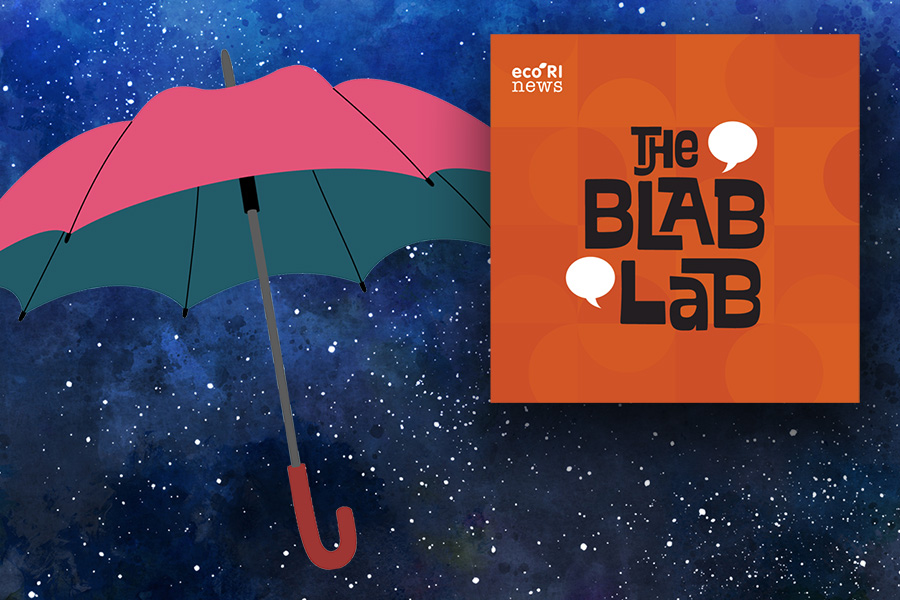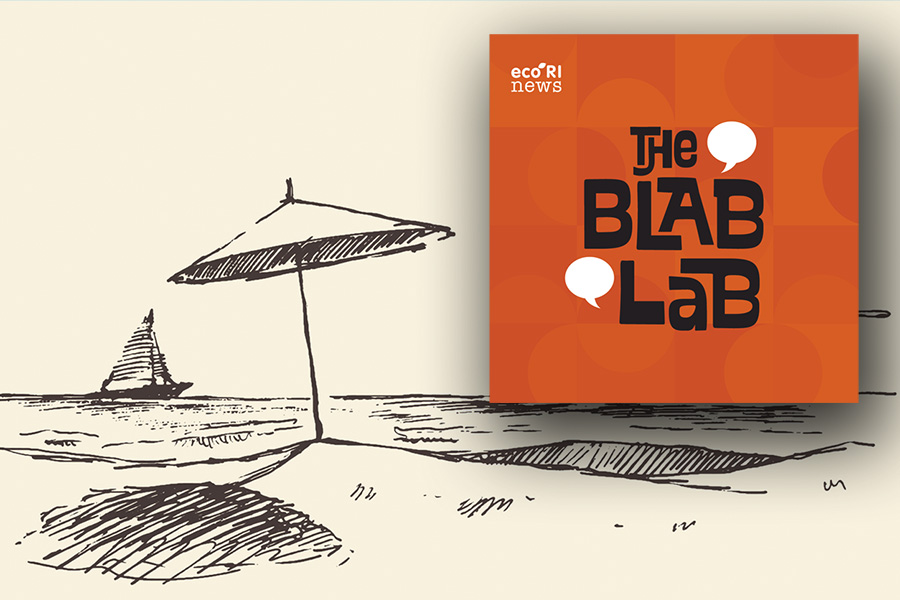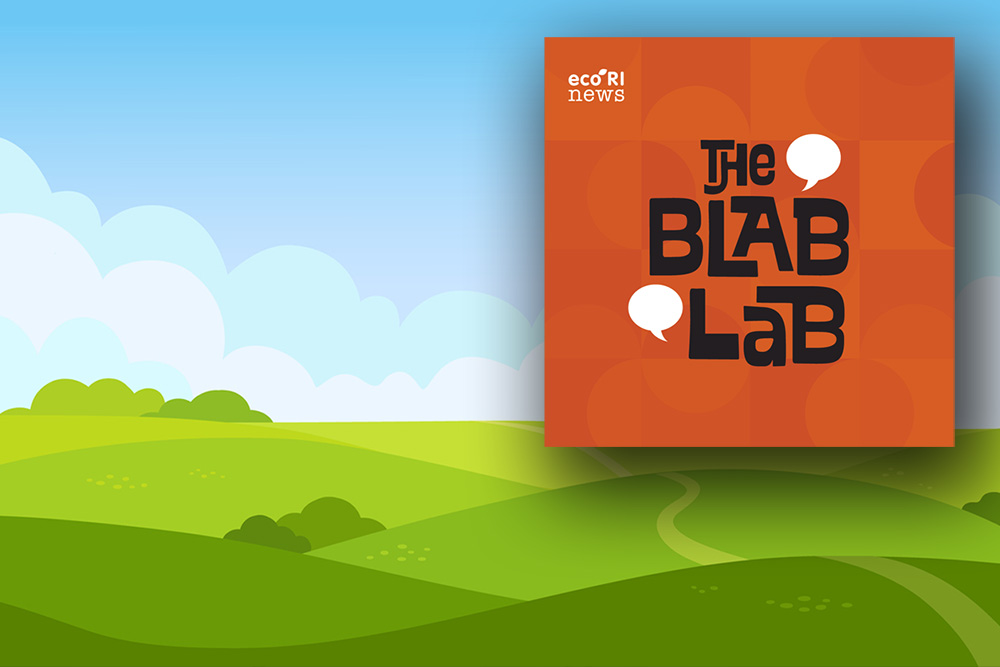How Not to Be Trashy During the Holidays
December 7, 2023
Americans produce 25% more waste between Thanksgiving and New Year’s Day than during the rest of the year. ecoRI News staffers offer tips on reducing holiday waste without being a Scrooge.
Subscribe and listen on iTunes, Spotify, or wherever you get your podcast.
This transcript was edited for clarity and length.
Colleen
Welcome to the Blab Lab, a twice monthly podcast from reporters of ecoRI News where we unpack the critical environmental issues facing southern New England. I’m reporter Colleen Cronin, and today, I’m here with my colleagues, Rob Smith and Jo Detz to talk about one of our favorite holiday subjects: the most wasteful time of the year.
Colleen and Jo
It’s the most wasteful-est time of the year!
Hi, Jo.
Jo
Hey, Colleen.
Colleen
Hey, Rob.
Rob
Hi, Colleen.
Colleen
Rob is giving us a look of disgust.
Rob
You both just burst out into song!
Colleen and Joanna
You were supposed to join us?
Rob
I didn’t know there would be singing.
Colleen
Didn’t you read the script?
Rob
No.
Colleen
Just kidding. It wasn’t in the script. It was just impromptu because we’re …
Jo
I know, I was thinking about it. So, we’re just on the same …
Colleen
… wavelength.
Jo
Terrifying.
Colleen
So usually, Frank is the bearer of bad, grinchy news, but today, we have two other Grinches here.
Jo
Thanks. Yeah, I mean, why should Frank have all the fun?
Rob
We’re excited to be here.
Jo
He’s at home being grinchy.
Colleen
Before we get too holiday specific, maybe we could start by talking about how well or poorly our recycling systems and waste systems work now? Just so people get a sense of like, this is obviously maybe a bigger problem during the holidays, but this is also a problem all the time. And I know both of you have written about this. Rob, do you want to start?
Rob
About how bad we are at recycling our waste problem?
Colleen
Yeah.
Rob
Well, to be the Grinch of bad news, our landfill is filling up. In the next 15 or 20 years, the Central Landfill in Johnston is filling up and, in our lifetimes, we’re going to have to find someplace to put our trash; we’re literally running out of room to put our trash. And every time you put something in your trash, it’s going to the landfill. And we can’t recycle away out of the problem either.
Jo
Even with recycling, I mean plastic recycling …
Rob
Plastic recycling is basically a myth. It’s probably getting landfill-ed, there’s really nothing you can do with plastic. And it’s not even good to turn it into other products like clothing, because that just also contributes to microplastics and other not great things, that I’m sure will have future health impacts that we don’t understand yet, which is just exciting. But our landfill is running out of room, and we don’t have any place to put the trash anymore. Though WALL-E, that the Pixar movie where the world is full of trash, because they keep …
Colleen
Yes.
Rob
That’s how I think of it, that we’re just going to have the world full of trash and litter.
Jo
Happy holidays!
Rob
Do you have a follow-up question before I start rambling, Colleen?
Colleen
Thank you, Rob. I think that was great explanation. Jo, you have written about specifically how the holidays are a bit of a time for this sort of wastefulness to be on steroids a bit? What are some of the, you know, maybe big offenders here during the holidays?
Jo
Yeah, I mean, so the statistics show, according to a study that was done by Stanford University, household waste increases 25% between Thanksgiving and Christmas. And that amounts to about a million tons more of trash being sent to the landfill each week during that time frame. And that’s for the United States. So, you know, when you think about it, you can imagine your own holiday meals/celebration, a lot of people might get more food than they can eat, and then throw it out, put it in the trash that’s going to contribute to the landfill, you know, wrapping paper, disposable plates for parties, it all adds up. Because you’re just doing more, you’re doing more socializing, more eating, more gift giving, and it just amounts to a lot of stuff. And for the most part that that stuff is not sustainable, and the remains of it go into the trash.
Colleen
So, what are some things that you suggest are some things that can be helpful on maybe the food waste and the things?
Jo
Yeah, so any way that you can actually capture and eat the food that is leftover is the best outcome for food, so-called food waste.
Colleen
Your turkey sandwiches.
Jo
Yeah, but your freezer is your best friend. Even if you don’t want to eat that turkey right away. You can put just about anything in the freezer and take it out. You know, when you are thinking you might want that Thanksgiving meal again, or you can reconstitute it into Thanksgiving burritos …
Colleen
Ooo!
Jo
… or like a like a scramble. So, there’s just so many things that you can do to keep from putting that food in the trash if you’re having a big meal. Think about asking guests to bring containers to take home leftovers or you can provide them with little foil packets. They can take that home. I mean, who doesn’t want not to cook after, you know, consuming a big meal and you wake up with like a belly hangover.
Colleen
Lots of tryptophan!
Rob
Who doesn’t take holiday leftovers?
Colleen
That’s what I want to know.
Rob
Who are they? Show me them, let’s put them … let’s … you go to jail for 1,000 years. Like who says no to that?
Colleen
We know what Rob would do if he ran the world.
Rob
It’s the best part of the holidays are the leftovers with the turkey sandwiches and whatever.
Colleen
Do you guys have any things like you do with leftovers that you think is unique?
Rob
Well, if you if you can’t eat it, please compost. I think I say this every time I come on this podcast, but I’m a big fan of composting and you should compost as much as humanly possible. Not all food is good for leftovers. So, if you do have to throw anything away quote unquote, compost it.
Colleen
Jo, you’re a great cook and I’m excited to go to your Frankgiving. Well, actually Frank’s cooking, so never mind, but I’m still excited to go even if the food isn’t Jo Detz quality.
Rob
He’s Italian, it should be fine.
Jo
We got a turducken guys!
Rob
Wow!
Colleen
So, what do you do with that? Do you do anything special with that turducken after? Or what are your, some of your fun things that you do with holiday leftovers?
Jo
Well, I’m a vegetarian but we do, for Thanksgiving, get usually like a whole chicken or a small turkey for me and Frank, my husband.
Colleen
And ecoRI columnist and senior reporter.
Jo
And ecoRI columnist and senior reporter.
Colleen
She says begrudgingly.
Jo
So, you know, he does a pretty good job carving the turkey with his hands and picking off all the meat like an animal. It’s true, Rob.
Rob
What! Just use a knife.
Jo
You know knives are … the best tools are … I don’t know. Anyway, you get a lot of meat off with your hands.
Rob
OK.
Colleen
I’ve been into that rotisserie chicken in the middle of the night. I understand. Keep going.
Jo
So, you know once that, once that carcass is fully harvested, I don’t compost it yet. I do throw it in a pot with some water and I boil it down and I make stock for — it doesn’t always make it to chicken soup usually.
Rob
You can use it for a lot of things.
Jo
The dogs are usually the benefactors of that so called turkey juice.
Colleen
Sadie does not like to eat her food unless she has some chicken stock on it.
Jo
Yes, my dogs are a little picky. So, you know, and then that carcass is almost nothing and then it goes from the compost bin and so that’s what we do.
Colleen
Moving on to some of the wrapping parts of this this gift-giving season, we’ve got eight nights of Hanukkah, we’ve got Christmas, we’ve got lunar new year coming up and we’ve got Kwanzaa — what do you guys do? Or Jo, what are some things that you can do that maybe can help you reduce waste on that end? Because I think of all of the wrapping paper that we use.
Rob
I think you can buy… I mean what I usually do is it’s always fun to go somewhere and get the free paper wherever you live. If you live in northern Rhode Island, The Valley Breeze. You can get my former employer, Motif Magazine. That’s what we used to do for our secret Santa when I worked there because we had a ton of old issues around. And its paper that’s already printed and it will biodegrade. Or you can buy, I think you can probably buy biodegradable wrapping paper if you really want to, just don’t buy the plastic stuff.
Jo
Yeah, it’s I think the statistic is 80,00 tons of wrapping paper are used during the holiday season. And that accounts to about 50,000 trees worth of papers. So, anything you can do to cut down on new wrapping paper, like Rob’s suggestions, are great. Unfortunately, newspapers are becoming harder to find, but they’re still there.
Rob
It’s why I suggest free papers because even if you subscribe to a newspaper, it may just be the digital version.
Jo
Exactly.
Rob
If you’re in my home I’m bad at wrapping. So, what my family has always done (no one in my family is really good at wrapping) but we’ve always done these gift bags. So, we use the gift bags. So, there are some gift bags in my family that keep getting exchanged over the years.
Colleen
When I was growing up, my mom sometimes, especially with the really pretty wrapping paper that was like kind of thick, nice wrapping paper, she’d be like “just be really careful when you take it off.” And then we’d reuse it.
Jo
Yeah, same with bows, you know, you can reuse those. Another thing is like you can go to a thrift shop and get some pretty tea towels, or bandanas and put gifts in those or mason jars are nice for something so yeah, you just have to get creative. And that’s you know, kind of part of the fun.
Colleen
I don’t know if you guys do Christmas trees, and I don’t know if we even want to get into this debate.
Jo
Oh, yeah!
Colleen
Like, you know, live tree versus plastic.
Rob
We have a plastic Christmas tree.
Colleen
Oh, Rob.
Rob
We had a real one growing up, but my wife wanted a plastic one. So, we do plastic, and we may not even put it up because the dogs are a little disruptive now but …
Colleen
Jo, what is the verdict on the plastic versus the real?
Jo
So full disclosure, I am Jew-ish. So, I’m wading into …
Colleen
But you’re married to an Italian.
Jo
I’m married to an Italian. So, I think the verdict on Christmas trees is like, OK, so here’s the Holy Grail, there are some Christmas tree farms that rent out potted live trees. So, you can take that tree, use it for the holidays and bring it back to the farm, and then they will plant it or reuse it. The plastic Christmas trees are made from PVC, which is a carcinogen. If you keep them for 10 years or more, I think that on the balance that is better.
Rob
We’re planning on keeping it forever. And that’s why. I mean, I also don’t think it’s that environmentally bad. Because, well, I mean, I don’t have the … when I was growing up, we didn’t have the Boy Scouts coming to take the Christmas tree once we were done with it. We were doing the same thing with any yard debris that was around the house growing up, leaves or fallen branches, and just throwing it out in the woods and letting nature take it and return to the earth.
Jo
Yes, yeah, and there are some places that have some goat farms will take your trees and the goats will eat it. I mean, honestly, the Festivus pole is environmentally friendly.
Rob
Stay winning …
Jo Detz
… of all day Christmas decorations.
Colleen
I am from the Cape, as listeners know, and there was a program that was on the Cape, I don’t know if it’s still happening where they would take people’s trees and they put them out on the beach, because I guess that would help with erosion or something like that.
Rob
That’s interesting.
Colleen
So, I feel like if you do either, like if you have a plastic Christmas tree, what I’m hearing is perhaps it’s a good idea to get one you really like so that you keep it for a long time. And then if you’re doing a real Christmas tree, there’s potted options. And then also, you know, maybe trying to do something better than just taking it to the landfill. Literally.
Rob
Literally anything is better than taking into the landfill.
Colleen
And that will be the title of this episode.
Rob
Literally that is the message of today’s podcast, like do not … do anything you can to avoid putting stuff in the landfill.
Colleen
Is there anything else that like you guys any tips that you have? Or like maybe particular things that you think environmentally people should avoid this season?
Jo
Well, like just be thoughtful about the gifts that you give and think about what people actually need versus what they want. Food gifts are great. You can put those in mason jars like homemade granola or cookies and give those as gifts. Giving experiences instead of tchotchkes. I try to do that for my little nieces. I’m not sure I’m sure that they would prefer like the latest thing but sort of thinking about what you’re buying, and you know, making sure it’s something that the person actually is going to want to need.
Colleen
Rob, any other tips?
Rob
Don’t buy plastic, or you can make gifts. My sister has actually already told me what she was giving me and everyone else this year and she made vanilla, she’s been making vanilla extract since the summer since I guess it takes, I guess it takes six months to ripen or I don’t know. She saw it on a TikTok, honestly. But she showed me, and she’s got like, I don’t know, a dozen glass bottles in the basement, just chilling. I don’t really know how the process works. But apparently, it’s like some kind of vodka and vanilla. So that’s, so I guess like that gift is always a good idea. And there’s always some kind of faddish thing on TikTok or some other terrible website or application that you can do from home.
Jo
Tell us how you really feel.
Rob
Well, she called us grinches, so we got to live up to it.
Colleen
Do you think anybody still gets coal in their stocking? Because that I do think is probably not good for the environment.
Rob
I don’t think anyone’s gotten coal since like 1940, dude.
Jo
No, and it’s hard to put natural gas in someone’s stocking.
Rob
It’s really smelly.
Jo
Not advisable.
Colleen
And on that note, thank you both for coming. Thanks, Jo. Thanks, Rob, for coming on the show today. And thank you to our listeners for following along. We want to thank Vanessa Carleton for letting us use her song “Willows” for our theme song, which you hear at the beginning and end of every episode. And Jo, thanks for being a guest and also for editing the podcast and mixing it and fixing all of my editing mistakes.
Jo
Wait, I’m editing this?
Colleen Cronin
Well, you might need to mix in, over our holiday song that we did in the beginning.
If you have any questions, tips or podcast ideas, email me at [email protected]. And until next time, if you want to read more environmental Rhody news, you can check out our website, ecori.org.
Categories
Join the Discussion
View CommentsYour support keeps our reporters on the environmental beat.
Reader support is at the core of our nonprofit news model. Together, we can keep the environment in the headlines.
We use cookies to improve your experience and deliver personalized content. View Cookie Settings



